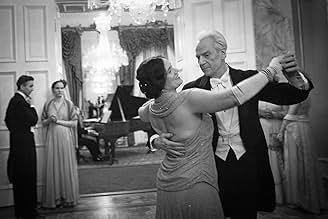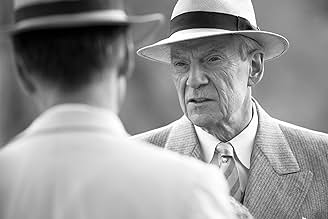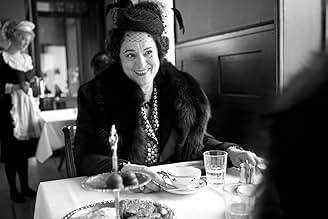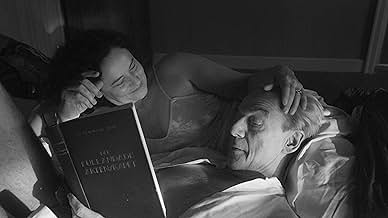Ajouter une intrigue dans votre langueA story based on the life of journalist Torgny Segerstedt, who alerted the Swedish public to the threat of Fascism in the 1930s.A story based on the life of journalist Torgny Segerstedt, who alerted the Swedish public to the threat of Fascism in the 1930s.A story based on the life of journalist Torgny Segerstedt, who alerted the Swedish public to the threat of Fascism in the 1930s.
- Réalisation
- Scénario
- Casting principal
- Récompenses
- 3 victoires et 7 nominations au total
Avis à la une
7vsks
It was troubling to view Swedish director Jan Troell's 2012 film based on the experience of crusading journalist Torgny Segerstedt, so soon after the recent tragic assassinations at Charlie Hebdo in Paris. Segerstedt was editor-in-chief of one of Sweden's leading newspapers, and between 1933 when Hitler came to power and his own death in 1945, Segerstedt was a fierce opponent of Naziism, even though much of Sweden's leadership, including the king, was determined to remain neutral and out of the war. The struggle for journalists' right—some would say duty—to speak out despite risks to themselves and others has not ended. Beautifully played by Jesper Christensen, Segerstedt left himself open to criticism and to the devaluing of his motivations by his long affair with a Jewish woman, wife of his publisher. Hollywood's crusading journalists are noble and flawless (think All the President's Men), their presumed moral authority overshadowing any rough spots in their personalities, whereas Segerstedt's uncompromising character is pompous at times and unpleasant at others, he basks in his celebrity, and he's downright cruel to his wife. "Easy to admire, but very hard to like," said RogerEbert.com reviewer Glenn Kenny. Truth told, he loves his dogs best. Producing this film in black and white may have symbolic significance or may be just the preferred Scandinavian style—the film is Swedish, after all. In another Bergman-like touch, Segerstedt sees and converses with the black-clad ghosts of his mother and other women. Slow-moving, like the clear stream (of words?) against which the opening and closing credits appear, there is only a fleeting soundtrack to support the action. The film left me with a lot of unanswered questions. What happened with his writing? When the authorities demanded that a particular edition not be distributed because of its anti-Nazi editorial (which suggests they had imposed some censorship regime), Segerstedt printed it with a big white space where the editorial would have been. Nice. But we never learn whether he was allowed to continue writing after that (or how he was stopped) until a scene that takes place years later. How did the war affect the Swedish people? There's little hint of that, beyond putting up blackout curtains. It seems they had electricity, they had food, petrol, champagne at New Year's. It's primarily the awareness of Nazi behavior that the viewer brings to the film that explains and justifies both Segerstedt's simmering outrage and his country's policy of appeasement. He and his mistress both have suicide plans, if it came to that, but in the absence of any tangible, on-screen threat, their preparations seem self-dramatizing and almost childish. Segerstedt in a sense provides his own epitaph, which is also the Swedish title of the movie—"Judgment on the Dead"— based on a line from a famous Old Norse poem, which says the judgment on the dead is everlasting. History's judgment on Segerstedt would be that he was of course right about the Nazis. And if, as the King believed, it would have been his fault if the Germans invaded the country, he would have been among the first to die. NPR's Ella Taylor called the film "A richly detailed portrait of a great man riddled with flaws and undone by adulation."
Borrowed from a library, this movie was first watched by a friend. Because I had picked the movie because of its theme, I was, hence, tentative. The friend found the movie long and made too complicated with its English subtitles and 'ghosts'. However, this is a friend who cannot sit and watch a movie... has to get up and 'do other things' in 'the boring sections'. Does not work with subtitles.
So, I began to watch it with some apprehension. Which swiftly disappeared. Perhaps because I am an activist/dissident in Canada (and I use such movies to ask myself and others, what makes us so naive about our failed democracies when we have stories like this in our history?), it was the subtitles of the dialogue that struck so true. And, being male, (my friend is female) I could relate with the man's inner turmoil. Making the ghosts of three important women in the main character's life becomes an effective tool for exposing this man's conscience. It is also good to follow up the movie with the extras provided with the DVD.
This is a movie I would buy for my collection of 'movies for reflection' on human behaviour that becomes sad ignorance of situations like this... where governments push down the truth. Sweden might use the excuse that they had to do what they had to do to suppress this man and his defence of freedom of speech. This movie simply emphasizes that we have no excuse.
So, I began to watch it with some apprehension. Which swiftly disappeared. Perhaps because I am an activist/dissident in Canada (and I use such movies to ask myself and others, what makes us so naive about our failed democracies when we have stories like this in our history?), it was the subtitles of the dialogue that struck so true. And, being male, (my friend is female) I could relate with the man's inner turmoil. Making the ghosts of three important women in the main character's life becomes an effective tool for exposing this man's conscience. It is also good to follow up the movie with the extras provided with the DVD.
This is a movie I would buy for my collection of 'movies for reflection' on human behaviour that becomes sad ignorance of situations like this... where governments push down the truth. Sweden might use the excuse that they had to do what they had to do to suppress this man and his defence of freedom of speech. This movie simply emphasizes that we have no excuse.
Saw it at Busan International Film Festival(BIFF), and it was the most disappointing film of the weekend.
In fact Torgny Segerstedt's story, in which an anti-Nazi journalist became a political martyr, is quite fascinating. His relationships with women are also intriguing drama material. In addition to those good ingredients, the director Jan Troell had one more ambition: making this film as a journey to the mind of Mr. Segerstedt, rather than a bland and harmless biography. What could go wrong?
First of all, making a black and white period piece with digital cameras(Arri Alexa) was not a good idea; especially when you start your film with real archive films filled with gritty film grains. The images here lack any depth of field, resulting in images which are crisp and dull at the same time. The whole feature felt like a cheap TV reenactment of the actual events, rather than an artistic reinterpretation.
The script is not good as well. Without some fantasy elements based on a Bergman tradition, the whole feature consists of a series of important events in the protagonist's life. The timing is always off; things just come and go without proper investments. Most of all, even though it is based on the real events during World War 2, there is no sense of dread or grief.
Even though Jesper Christensen's performance was stellar, I cannot recommend this film. It is a film made with good intentions, but fails to live up to them.
4/10
In fact Torgny Segerstedt's story, in which an anti-Nazi journalist became a political martyr, is quite fascinating. His relationships with women are also intriguing drama material. In addition to those good ingredients, the director Jan Troell had one more ambition: making this film as a journey to the mind of Mr. Segerstedt, rather than a bland and harmless biography. What could go wrong?
First of all, making a black and white period piece with digital cameras(Arri Alexa) was not a good idea; especially when you start your film with real archive films filled with gritty film grains. The images here lack any depth of field, resulting in images which are crisp and dull at the same time. The whole feature felt like a cheap TV reenactment of the actual events, rather than an artistic reinterpretation.
The script is not good as well. Without some fantasy elements based on a Bergman tradition, the whole feature consists of a series of important events in the protagonist's life. The timing is always off; things just come and go without proper investments. Most of all, even though it is based on the real events during World War 2, there is no sense of dread or grief.
Even though Jesper Christensen's performance was stellar, I cannot recommend this film. It is a film made with good intentions, but fails to live up to them.
4/10
I loved this movie.
I couldn't disagree more with the two previous reviewers. I almost wondered whether they had been watching the same film. The pace of Troell's film allows you time to reflect as the story develops.
No, it's not Raiders of the Lost Ark nor is it in colour, but it is a thoughtful, beautifully made film which stays in your mind long after you have left the cinema.
And I'm not alone in rating this film. Most of the other reviews have praised the quality of the script, the camera-work and the way Troell manages to get such amazing performances from his actors.
In my opinion, a must-see.
I couldn't disagree more with the two previous reviewers. I almost wondered whether they had been watching the same film. The pace of Troell's film allows you time to reflect as the story develops.
No, it's not Raiders of the Lost Ark nor is it in colour, but it is a thoughtful, beautifully made film which stays in your mind long after you have left the cinema.
And I'm not alone in rating this film. Most of the other reviews have praised the quality of the script, the camera-work and the way Troell manages to get such amazing performances from his actors.
In my opinion, a must-see.
Jesper Christensen with his Danish accent isn't very credible in his role as the Swedish newspaperman Torgny Segerstedt, famous for his uncompromising anti-Nazi stance. And could Jan Troell be any more boring director? Instead of making a movie about a man who stould up for liberty and against nazism to a great cost for himself, the director Troell just zeros in on his personal life and mistresses.
Le saviez-vous
- AnecdotesThis is the second movie in which Jesper Christensen and Pernilla August are parts in a wife-husband-mistress triangle. Here Pernilla August is the mistress, in Drabet (2005) she was the wife.
- GaffesIn the movie at a party which is supposed to take place 1938 the swedish song "Hur har du det med kärleken idag?" is played and also sung by the character Maja Forssman. This song is from 1945 and was then made popular by the famous swedish artist Ulla Billquist.
- Bandes originalesFinlandia
Written by [nm=0006292]
Meilleurs choix
Connectez-vous pour évaluer et suivre la liste de favoris afin de recevoir des recommandations personnalisées
Détails
- Date de sortie
- Pays d’origine
- Langues
- Aussi connu sous le nom de
- Dom över död man
- Lieux de tournage
- Sociétés de production
- Voir plus de crédits d'entreprise sur IMDbPro
Box-office
- Montant brut aux États-Unis et au Canada
- 62 506 $US
- Week-end de sortie aux États-Unis et au Canada
- 9 020 $US
- 22 juin 2014
- Montant brut mondial
- 328 005 $US
- Durée2 heures 6 minutes
- Couleur
- Rapport de forme
- 1.78 : 1
Contribuer à cette page
Suggérer une modification ou ajouter du contenu manquant

Lacune principale
By what name was The Last Sentence (2012) officially released in India in English?
Répondre






























